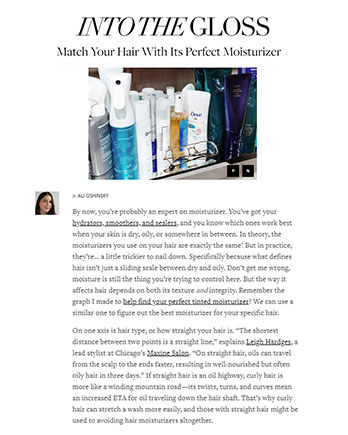Into the Gloss July 3rd, 2020
 Into The Gloss
Into The Gloss
Beauty
Match Your Hair With Its Perfect Moisturizer
By now, you’re probably an expert on moisturizer. You’ve got your hydrators, smoothers, and sealers, and you know which ones work best when your skin is dry, oily, or somewhere in between. In theory, the moisturizers you use on your hair are exactly the same! But in practice, they’re… a little trickier to nail down. Specifically because what defines hair isn’t just a sliding scale between dry and oily. Don’t get me wrong, moisture is still the thing you’re trying to control here. But the way it affects hair depends on both its texture and integrity. Remember the graph I made to help find your perfect tinted moisturizer? We can use a similar one to figure out the best moisturizer for your specific hair.
On one axis is hair type, or how straight your hair is. “The shortest distance between two points is a straight line,” explains Leigh Hardges, a lead stylist at Chicago’s Maxine Salon. “On straight hair, oils can travel from the scalp to the ends faster, resulting in well-nourished but often oily hair in three days.” If straight hair is an oil highway, curly hair is more like a winding mountain road—its twists, turns, and curves mean an increased ETA for oil traveling down the hair shaft. That’s why curly hair can stretch a wash more easily, and those with straight hair might be used to avoiding hair moisturizers altogether.
Sound too simple? That’s because you’re still missing the second half of the equation! It’s called hair porosity, or how much water your hair absorbs on its own. When your hair is highly porous, it takes up so much water that the hair shaft swells, leading to breakage. But porous hair also gets drier faster, because the cuticle, a protective, hydrophobic coating, is too broken up to keep water in. “Coily hair is typically more porous than straight hair,” says Hardges, but they’re not mutually exclusive. She also cites things like bleach and other chemical treatments, heat damage, tension stress, frequent shampooing, UV exposure, and plain ol’ genetics as factors in hair porosity. (If you're unsure how porous your hair is, take this quick, easy quiz to find out.) Treating porous hair is very similar to treating dry skin: the name of the game is coating it with thick, oil-based products to rebuild hair’s moisture barrier.
Your hair falls somewhere between these two axes—knowing its precise location can help you Goldilocks your way to happy, healthy, envy-worthy hair. Here’s where to start:
Quadrant I
Going counter-clockwise from the top right, first you’ll find straight and wavy hair on the high porosity end of things. If you fall into this category, your hair probably gets greasy on its own, but because of bleaching, processing, heat, or infrequent trims your hair is dry and thirsty. You could use the extra protection of something oil-based, though you’ll have to be mindful of greasiness. Look for products with water-attracting humectants (glycerin, aloe, and honey) alongside light oil emulsifiers, like argan, jojoba, grapeseed, and sweet almond. Ingredients like wheat, vegetable, and quinoa proteins are also helpful to rebuild a healthy cuticle.
Some suggestions…
Playa Monoi Milk Leave-In Conditioner
Reverie Milk Anti-frizz Leave-in Nourishing Treatment
Shea Moisture Manuka Honey & Yogurt Multi-Action Leave-In
Ouidad Advanced Climate Control Featherlight Styling Cream
Quadrant II
Low-porosity, mostly straight hair is probably already the most resistant to hair moisturizers, but there’s still something out there for you! You’re right to stay away from anything too moisturizing or oily. “Hair that’s over-conditioned feels weighed down or gummy, appears stringy, and will not respond to thermal styling,” adds Hardges. But even straight, shiny hair that doesn’t need much help building up its moisture barrier can benefit from something strictly hydrating, like an aloe vera-based mist.
Some suggestions…
Christophe Robin Hydrating Leave-In Mist with Aloe Vera
Rahua Hydration Detangler + UV Barrier
Quadrant III
If your hair is curly, but its porosity is low, you're kind of a hair unicorn. Yours can be the trickiest to treat, because you’ll have to strike a balance. On the one hand, you’ll need to nourish dry ends because your natural scalp oils take longer to reach down the lengths of your curls. But you’ll need to do so without adding heavy oils, which will build on top of your already healthy cuticle and prevent adequate moisture from seeping in. Look for something lightweight and full of humectants, like a milk, to do the job.
Some suggestions…
Oyin Handmade Hydrating Herbal Leave-In
Kinky-Curly Knot Today Leave In Detangler
Quadrant IV
And finally, this is where you’ll live if your hair is curly to coily and extra thirsty. Look for proteins, heavier oils like coconut and castor, and butters like shea, murumuru, mango, and cupuacu. You may also benefit from using multiple layers of moisturizers, called the LOC method. “The holy grail of moisturizing routines starts with soaking wet hair, then applying leave-in conditioner, followed by nourishing hair oil and finished with a cream styler,” explains Hardges.
Some suggestions…
Melanin Haircare Multi-use Softening Leave In Conditioner
Devacurl Leave-In Decadence Ultra Moisturizing Leave-In Conditioner
Curlmix Pure Avocado Moisturizer with Organic Castor Oil
Alikay Naturals Moisture Rich Hair Parfait
Hardges also notes that it is possible to reduce the porosity of your hair with products, so your position on the porosity axis may change over time. In addition to consistent use of moisturizers, she often recommends her high-porosity clients try a clear gloss, which temporarily coats hair in a sort of pseudo-cuticle. An acidic wash with apple cider vinegar can also help prevent cuticle swelling. And, once a damaged cuticle is restored, you might actually find that your hair is naturally curlier than you realized.
But for now, where does your hair fall? I’d say my straight, virgin, otherwise healthy hair is somewhere around (3, 14), considering how desperate I am for a haircut.
